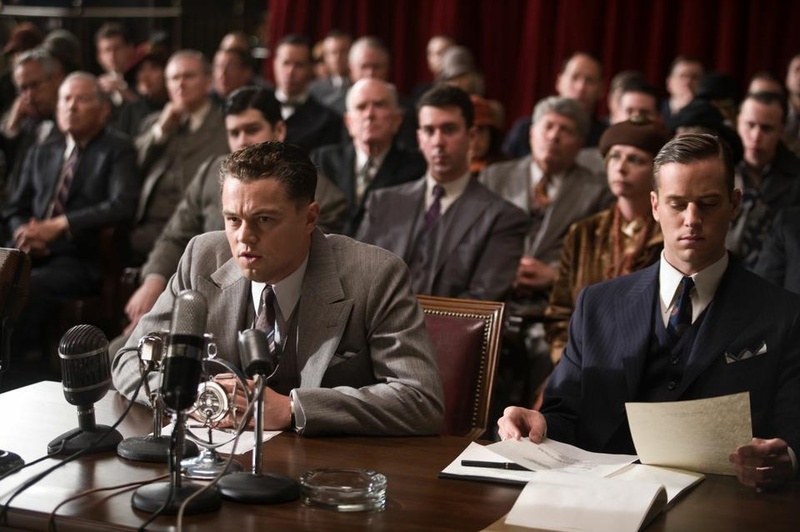
Leonardo DiCaprio stars as J. Edgar Hoover, the legendary head of the Federal Bureau of Investigation, in Clint Eastwood’s new biopic, “J. Edgar.”
This might be the movie that finally nets Leonardo DiCaprio an Oscar. His portrayal of J. Edgar Hoover, the first director of the Federal Bureau of Investigation (FBI), is one of the best performances of his entire career. Clint Eastwood’s “J. Edgar” provides the perfect platform for such a tour-de-force. The biopic devotes as much effort to painting J. Edgar Hoover as a deeply troubled closeted homosexual as it does to presenting him as the cunning and ruthless personality who built up one of the most powerful and influential organizations in 20th-century America. Thus, although its plot is too fragmented to maintain consistent and compelling energy, “J. Edgar” still serves as a sublimely acted and starkly beautiful portrait of a man who even today holds a very contentious place in the public conscience.
As depicted in the film’s script—written by Dustin Lance Black of “Milk” fame—Hoover was a man who hid his profound insecurities behind a mask of total confidence. Throughout the movie, DiCaprio wears this disguise well, with a furrowed brow and quick, sharp speech that makes him the picture of self-control and seriousness. But when the mask comes off—as it does often enough—DiCaprio lets all of Hoover’s private angst and self-loathing completely consume his persona. The performance is masterfully executed and deeply moving. It alone provides sufficient reason to see “J. Edgar.”
Though DiCaprio’s act is the centerpiece of “J. Edgar,” some of his co-stars’ performances are similarly impressive. Armie Hammer has come a long way from his portrayal of the infuriating braggadocio of the Winklevii in “The Social Network.” Here, he plays Hoover’s right-hand man and eventual love interest Clyde Tolson with a mature subtlety that makes the potentially awkward sexual tension between the two characters much more convincing.
Naomi Watts fills the role of Hoover’s longtime secretary Helen Gandy. Though Watts gives a well-executed performance, Gandy seems slightly peripheral, thanks to her character’s stunted development as Hoover’s conflicted but fiercely loyal personal assistant. While the other two principal characters of the film grow far more cynical and world-weary as the movie progresses, Gandy remains unchanging in her devotion—a depiction that may be accurate but feels cinematically simplistic.
As one would expect from an Eastwood film, “J. Edgar” is visually arresting with fantastic production values. The makeup used to transform the actors as they age is nearly flawless. The sets and lighting situate the characters in a dark, gray world—one that reflects in an almost brazenly unsubtle manner the moral ambiguity and personal repression that characterize Hoover’s life and work.
But the film’s plot—that is, if a series of tenuously connected vignettes depicting only occasionally related events in Hoover’s life can be called a “plot”—undermines the otherwise profound emotional weight that it carries. Ostensibly, the movie’s main storyline involves the very public kidnapping of famed aviator Charles Lindbergh’s child and the manner in which Hoover used this event to consolidate and augment the power of the FBI. But the tale is so fragmented and unfocused that it’s impossible to get a feel for the pacing of the plot.
Indeed, pacing is the film’s biggest problem. “J. Edgar” spreads itself too thin in trying to comprehensively capture a career that spanned a half-century in a little over two hours. It leaps backward and forward in time in a scrambling attempt to cover this immense ground. The result is a film that feels confused in its focus, and jumps disjointedly between and within two massively different eras in a way that only rarely gives a clue as to its direction. Due to its overweening ambition–turned-disorderliness, “J. Edgar” prevents us from becoming completely immersed in its otherwise well-crafted world.
Such missteps are unfortunate, because there is so much here worth seeing. Ultimately, “J. Edgar” fails to truly distinguish itself due to its heavy-handed storytelling, the bane of far too many biopics. That said, “J. Edgar” nonetheless stands out for its unforgettable depiction of one of the most enigmatic, complex, and troubled figures in American history. See it for the person, not the plot.
Read more in Arts
Preview: Out Of Body












